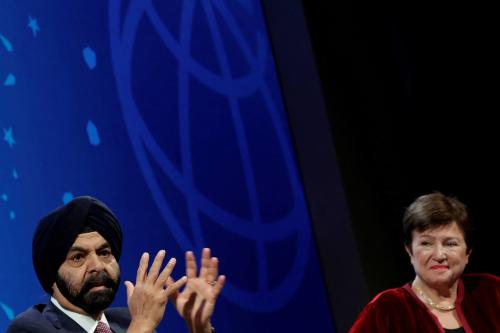With the resignation of Horst Köhler as Managing Director (MD) of the International Monetary Fund, European governments are horse trading among themselves to decide on a European successor. Why do Europeans presume the next IMF MD will be a European?
When the IMF and World Bank were created six decades ago, an agreement was reached between the Americans and Europeans that the United States would designate the President of the World Bank while the Europeans would designate the IMF’s MD. Although indefensible in substance, the old convention might have been an acceptable political compromise in the infancy of the two organizations. Today the presumption cannot even be defended as politically acceptable.
When Köhler became head of the IMF in 2000, the selection process was protracted and contentious. Because of that fiasco, working groups were established in both the IMF and the World Bank to review selection processes. Unfortunately, the 2001 report of the working groups dodged the difficult issues and failed to suggest clear criteria for selecting leadership of the IMF and World Bank. Yet refining selection procedures for the leadership of international organizations should be a top priority for national governments.
An even more basic problem at the IMF and World Bank needs attention. Because of historical and political inertia, Western European nations and even the United States exert voting influence and control of Executive Board constituencies disproportionate to those of developing nations. If the IMF and World Bank are to be perceived as legitimate, responding equitably to all the world’s people, adjustments in the relative sizes of countries’ quotas and voting powers to mitigate those imbalances are needed. Such adjustments will be politically complex. Realistically, they cannot be made in the near future. What can be done now is to reform the procedures for leadership selection.
Improved procedures should rest on two key principles: competence of prospective leadership, and transparency of process. When the head of either the IMF or World Bank is chosen, the selection process should identify multiple candidates who are deemed by governments or outside observers to be highly qualified. Nominations should be made to the Executive Board of the organization without regard to national origin. The Executive Board, where the ultimate decision is taken, should emphasize from the outset that an individual from any member nation is eligible to be chosen, regardless of geographical origin. Because judgments about competence are inevitably controversial, the Board’s choice of the best qualified person among the multiple candidates will of course be difficult. If the dominant criterion is a candidate’s competence, however, all member nations are most likely to accept the Board’s ultimate choice as reasonable.
Broad acceptance also requires transparency about how the choice is made. The IMF and World Bank in recent years have strongly advocated greater transparency for financial transactions and national governance. They have made available much more information about their own regular operations. National governments should promote a comparable transparency for the selection process for the top posts in these organizations. After the decision process is completed, for example, the names of the candidates seriously considered should be announced and a public report should summarize key aspects of the Executive Board’s deliberations.
In the current circumstances, a presumptively European choice among only European candidates cannot possibly demonstrate that the best qualified candidate has been chosen without regard to nationality. If governments are to nurture the legitimacy and credibility of the IMF, they must jettison the old European-American political compromise and replace it with a sensible modern-day process.
The United States government, by taking two far-sighted steps, can provide an essential stimulus for reform. First, it should state that the United States will no longer presume that the President of the World Bank should be an American and that at the time of his replacement the United States will support an open and transparent process considering multiple candidates of any nationality. Second, the United States should indicate that it will not approve the selection of the IMF’s forthcoming Managing Director until multiple candidates have been nominated from outside as well as inside Europe and until agreement in principle is reached that the best qualified candidate will be chosen from amongst all nominees without regard to national origin.



Commentary
Op-edIMF Leadership: What the United States Should Do
April 1, 2004